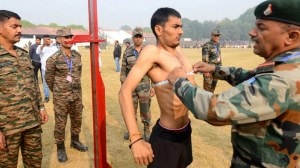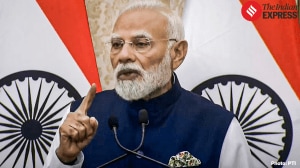Nuclear vision — Vajpayee shows wisdom; now forge a consens
The government evidently does not judge this the appropriate time to make a comprehensive statement on post-Pokharan-II security policy. ...

The government evidently does not judge this the appropriate time to make a comprehensive statement on post-Pokharan-II security policy. However, the Prime Minister did take the opportunity of a foreign policy debate in Parliament to set out the broad outlines of what sounds like an emerging nuclear policy.
The government’s position on the Comprehensive Test Ban Treaty (CTBT) has been made more explicit than hitherto. This is wise. Although Atal Behari Vajpayee’s statement that ways of adhering to the treaty are being explored does not amount to an unequivocal decision to sign the treaty, matters are moving in that direction. It would not be right to leave the country guessing about the objectives of the Strobe Talbott-Jaswant Singh talks. The first step has been to shake off diffidence about revealing the government’s stance in favour of the CTBT and the logic underlying it. The second should involve more thorough discussion with the opposition. Judging by the latest interventions in Parliament, politicalopposition to the CTBT may be tapering off but it cannot be taken for granted that major parties fully understand or agree with what the government has in mind. Political consensus on defence and foreign policies has always been necessary. In this era of the revolving door, it is imperative.
Vajpayee has set at rest one of the major doubts surrounding the government’s nuclear policy. A unilateral declaration of no-first-use of nuclear weapons, as distinct from a willingness to negotiate a no-first-use agreement with other states, confirms beyond all shadow of doubt a non-aggressive stance. It would have been more coherent to adopt an unambivalent position from the start. At this point it appears to be a reaction to the fact that there were no takers for the earlier proposition. Nevertheless, even late as it is, India’s no-first-use policy should carry conviction in the world. At the same time it is a mistake to expect Islamabad to feel pressurised to follow suit. A no-first-use posture is not logical intheory for Pakistan and official spokesmen have indicated as much before and after both countries went overtly nuclear this May. As Pakistan’s high commissioner put it recently, it is a question of maintaining the “strategic balance”. This refers to India’s overwhelming superiority in conventional arms to counter which Pakistan’s strategists argue they need nuclear weapons and a posture also described as defensive.
Clearly, a whole series of other confidence-building and stabilisation measures will be required vis-a-vis Pakistan. Parliament was right to condemn the linkage Islamabad makes between Kashmir and the nuclear question. But that was a foregone conclusion as was its unhelpfulness about putting the bilateral process back on track. With cross-border incidents being stepped up, all Pakistan’s tactics are in full play. The question before Indian policymakers is how to make it worth Islamabad’s while to sit across a table and talk. A united approach by all political parties is called for.Chest-thumping displays are easy and popular. A serious, hard-headed discussion would be more productive and should not be delayed.



- 01
- 02
- 03
- 04
- 05




























